|
|
|
Sort Order |
|
|
|
Items / Page
|
|
|
|
|
|
|
| Srl | Item |
| 1 |
ID:
178176
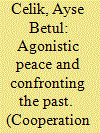

|
|
|
|
|
| Summary/Abstract |
This study analyzes how peace processes in socio-political environments that do not support ‘confronting the past’ (CTP) initiatives are affected by the exclusion and delegitimization of alternative narratives different from dominant ones concerning the nature and history of ethnic conflicts, focusing on Turkey’s failed peace process as a case study. It pays specific attention to the resistance against acknowledging alternatives to dominant narratives by considering the role played by bystanders and antagonistic citizens, who are not directly part of the conflict but nonetheless support it by remaining passive or directly/indirectly supporting dominant narratives. Driven by agonistic peace theory, the article shows how failing to turn these groups into agonistic citizens through some form of agonistic CTP initiative and allowing a space for alternative narratives can result in the fragility of efforts towards a transition to peace.
|
|
|
|
|
|
|
|
|
|
|
|
|
|
|
|
| 2 |
ID:
189945
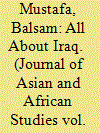

|
|
|
|
|
| Summary/Abstract |
This paper analyses five main slogans and chants performed during the first 3 months of Iraq’s 2019 Tishreen [October] protests. It aims to trace their origin to examine the transformation in the narratives created by each version. Drawing on a social approach to narrative and a social semiotic multimodal approach to communication, I treat slogans and chants as an evolving genre and performance, capable of triggering, constructing, and negotiating a different set of narratives in each adaptation. Such narratives arguably determine their impact. Unlike earlier versions, Tishreen chants and slogans succeeded in conjuring up collective and cross-sectarian narratives that could challenge master political narratives and heighten an Iraqi identity in the first place. It would, therefore, be hard to erase them from memory.
|
|
|
|
|
|
|
|
|
|
|
|
|
|
|
|
| 3 |
ID:
119954
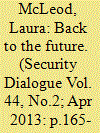

|
|
|
|
|
| Publication |
2013.
|
| Summary/Abstract |
Contemporary debates about security narratives highlight different forms of security: gender security, realist security or human security. The use of such terms often means that we do not recognize subtle variances within these narratives or the implications of these divergences. This article suggests and illustrates a way of achieving a deeper understanding of security narratives through investigating the temporal aspects of narrative content. A case study exploring three forms of gender security narratives among activists of feminist and women's organizations in Serbia is used to demonstrate that similar perceptions of gender security exist. However, paying attention to the temporal discontinuities within the contents of these gender security narratives makes it possible to identify divergences connected to personal-political imaginations of conflict and post-conflict. These subtle variations in content are potentially product and productive of different policy prescriptions and outcomes. This article concludes by reflecting upon the presence of our past and future in the contents of our contemporary security narratives, suggesting that when we consider security, our analysis should aim to incorporate an understanding of the temporal nature of a security narrative.
|
|
|
|
|
|
|
|
|
|
|
|
|
|
|
|
| 4 |
ID:
144081
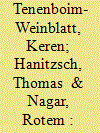

|
|
|
|
|
| Summary/Abstract |
This article presents a general framework for deconstructing and classifying conflict news narratives. This framework, based on a nuanced and contextual approach to analyzing media representations of conflict actors and events, addresses some of the weaknesses of existing classification schemes, focusing in particular on the dualistic approach of the peace journalism model. Using quantitative content analysis, the proposed framework is then applied to the journalistic coverage in the Israeli media of three Middle-Eastern conflicts: the Israeli–Palestinian conflict, the conflict surrounding Iran's nuclear program, and the Syrian civil war. The coverage is examined in three leading news outlets – Haaretz, Israel Hayom, and Ynet – over a six-month period. Based on hierarchical cluster analysis, the article identifies four characteristic types of narratives in the examined coverage. These include two journalistic narratives of violence: one inward-looking, ethnocentric narrative, and one outward-looking narrative focusing on outgroup actors and victims; and two political-diplomatic narratives: one interactional, and one outward-looking. In addition to highlighting different constellations of points of view and conflict measures in news stories, the identified clusters also challenge several assumptions underlying existing models, such as the postulated alignment between elite/official actors and violence frames
|
|
|
|
|
|
|
|
|
|
|
|
|
|
|
|
| 5 |
ID:
143655
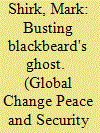

|
|
|
|
|
| Summary/Abstract |
Despite renewed interest, one area of piracy studies that can be improved is that of historical comparison. Most studies operate under the belief that piracy is an action similar enough to be compared across time and space. Yet piracy is a socially constructed concept that only has meaning within a narrative and most ‘waves’ of piracy are characterized by more than one narrative. Thus, comparing all acts of piracy across time and space necessarily means accepting a particular narrative about piracy as true. Much historical-comparative work on piracy compares contemporary piracy to that of the ‘golden age’ of piracy in the eighteenth century. By focusing on the narratives of both pirates and counter-pirates, piracy in Southeast Asia in the nineteenth century is more comparable to contemporary piracy in the Gulf of Aden. Both ‘waves’ were characterized by competing narratives of pirates defending local interests vs. the counter-piracy narratives of criminality. This approach highlights similar dynamics in each that can help researchers and policymakers make sense of piracy in the twenty-first century. In particular both ‘waves’ were characterized by the rise of local political formations built around piracy and the denial of the political content of piracy by counter-pirates.
|
|
|
|
|
|
|
|
|
|
|
|
|
|
|
|
| 6 |
ID:
160089


|
|
|
|
|
| Summary/Abstract |
This research explores the relationship between public narratives and the Italian military contribution to the International Security Assistance Force (ISAF) in Afghanistan (2001–2014). Despite attracting little attention in the literature, Italy has been one of the most crucial contributors of multilateral military missions around the world in the post-bipolar era. Italy has remained consistently engaged militarily in Afghanistan over the entire period of the ISAF mission. However, the country’s involvement has been characterised by differing and controversial views and perspectives among Italian political actors and the media. This study aims to reconstruct the core features of the strategic narratives and the media frames around the military intervention and it does so through a Qualitative Content Analysis on a collection of almost 200 articles published by four main Italian national newspapers. The goal of this paper is twofold: on the one hand, we systematically retrace the main discursive patterns and frames employed by the newspapers on the ISAF. On the other, we evaluate whether in the case of military interventions, the Italian media unveil critical inconsistencies and competitive arguments or whether they function as a repeater of the dominant political discourse. Thanks to the case study, we find that the Italian media supported the mainstream narratives.
|
|
|
|
|
|
|
|
|
|
|
|
|
|
|
|
| 7 |
ID:
184072
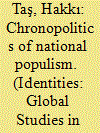

|
|
|
|
|
| Summary/Abstract |
Inspired by the populists’ salient urge to recalibrate and locate contingent developments within a larger temporal order and establish historical continuity, this paper dwells on the chronopolitics of national populism and calls for a systematic treatment of time in these movements. Focusing on the neglected narrative dimension, such an inquiry will afford an alternative reading from which to engage with and critique the magnitude of populism. This study argues that despite ample variance and claims of uniqueness, national populisms employ a shared temporal template that accounts for a particular national subjectivity through a set of timing and sequencing of events complemented by affective stimuli. It focuses on the case of Turkey. More pronounced since 2013 Gezi Protests, the rising tide of national populism under President Tayyip Erdoğan’s rule encapsulates how these populisms conflate the past, present, and future into a single narrative about the people’s survival and prosperity.
|
|
|
|
|
|
|
|
|
|
|
|
|
|
|
|
| 8 |
ID:
093725
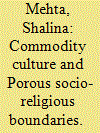

|
|
|
|
|
| Publication |
2010.
|
| Summary/Abstract |
Based on fieldwork, this article portrays the deep influence exercised by modern media on the women in a Muslim neighbourhood in Delhi during the past 30 years. While visual media consumption was earlier largely tabooed and restricted, today's consumers of media products appear significantly influenced by a media-driven com-modification of culture. The research findings indicate that a revision of 'traditional' assumptions about the lifestyles and thought patterns of Muslim women, at least in this particular neighbourhood in Delhi, is required to understand the current daily realities of Muslim women's lives in South Asia.
|
|
|
|
|
|
|
|
|
|
|
|
|
|
|
|
| 9 |
ID:
084242
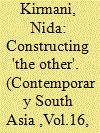

|
|
|
|
|
| Publication |
2008.
|
| Summary/Abstract |
The research for this paper is based in a majority-Muslim neighbourhood in South Delhi, Zakir Nagar. As with most urban localities, the borders around Zakir Nagar are permeable-with residents frequently moving in and out of the neighbourhood and coming into contact with members of other religious groups. Many of the residents of Zakir Nagar have also lived in religiously mixed areas previously. Furthermore, although the neighbourhood is itself identified as 'Muslim', it is by no means homogeneous, so that multiple social boundaries operate even within this locality. This paper looks more closely at the issue of religious identity as it was narrated in relation to various and shifting 'others'. These 'others'-referred to in the context of friendship, neighbours and marriage as well as in terms of discrimination, riots and 'communalism'-were often identified as 'Hindus' or as 'non-Muslims', but were also often referred to members of different class, status or regional groups. Hence, boundaries around 'us' and 'them' shifted according to context and were contingent upon various factors alongside religious identity. Through the narratives of Zakir Nagar residents, religious identity emerged as itself a problematic category whose meaning and
|
|
|
|
|
|
|
|
|
|
|
|
|
|
|
|
| 10 |
ID:
183709
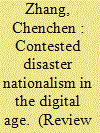

|
|
|
|
|
| Summary/Abstract |
This article examines how affective narratives of the COVID-19 pandemic on Chinese social media reinforce and challenge established scripts of national identity, political legitimacy, and international geopolitical imaginary. Taking theoretical insights from the scholarship on trauma, disaster nationalism, and politics of emotions, I structure the analysis of social media posts from state media and private accounts around three emotional registers: grief as a crucial site of control and contestation during the initial stage of the outbreak; gandong (being moved in a positive way) associated with stories of heroic sacrifices, national unity, and mundane ‘heart-warming’ moments; and enmity in narratives of power struggles and ideological competition between China and ‘the West’, especially the United States. While state media has sought to transform the crisis into resources for strengthening national belonging and regime legitimacy through a digital reworking of the long-standing repertoire of disaster nationalism, alternative articulations of grief, rage, and vernacular memory that refuse to be incorporated into the ‘correct collective memory’ of a nationalised tragedy have persisted in digital space. Furthermore, the article explicates the ways in which popular narratives affectively reinscribe dominant ideas about the (inter)national community: such as the historical imagination of a continuous nationhood rising from disasters and humiliation, positive energy, and a dichotomous view of the international order characterised by Western hegemony and Chinese victimhood. The geopolitical narratives of the pandemic build on and exacerbate binary oppositions between China and ‘the West’ in the global imaginary, which are co-constructed through discursive practices on both sides in mutually reinforcing ways. The lens of emotion allows us to attend to the resonances and dissonances between official and popular narrativisations of the disaster without assuming a one-way determinate relationship between the two.
|
|
|
|
|
|
|
|
|
|
|
|
|
|
|
|
| 11 |
ID:
168605
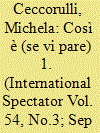

|
|
|
|
|
| Summary/Abstract |
The importance of the portrayal of reality in the press is well recognised, especially with respect to its capacity to affect public opinion. Articles on migration found in the Italian press with respect to four periods – the 2014 European Parliament elections; the end of the Mare Nostrum operation in the Mediterranean in 2014; the EU-Turkey Statement of March 2016; and an eventless week in 2016 – revealed five main narratives: solidarity, responsibility, state-centred (Westphalian), instrumental and humanitarian. Each of them had its own specificities, while all were informed by Italy’s condition as a frontline state with regard to migration – the EU’s gatekeeper – and its paradoxical state of living in a ‘permanent/potential emergency’, constantly torn by its inability to reconcile security and humanitarian needs. An understanding of justice as non-domination was the main result of the analysis carried out, while there was little reference to migrants’ human rights.
|
|
|
|
|
|
|
|
|
|
|
|
|
|
|
|
| 12 |
ID:
166976
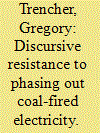

|
|
|
|
|
| Summary/Abstract |
Achieving temperature targets under the Paris Agreement requires urgent measures to curb construction of coal-fired power plants (CFPPs) and expediate the retirement of existing assets. As the world's fourth largest coal consumer, Japan's efforts to reduce coal usage are critical for international climate mitigation. Policies introduced after the Fukushima nuclear disaster have led to a rapid increase in solar. However deregulation of the electricity market has also prompted a rush of new CFPP constructions by new market entrants and incumbent utilities. In parallel, Japanese state agencies and industry are actively exporting CFPP technologies to developing countries. Although these domestic and international actions harbour serious consequences for global climate mitigation efforts, greater understanding of the factors driving Japan's coal dependency is needed to limit further lock-in of future carbon emissions. Filling this gap, this study critically examines narratives employed by actors in government and industry to sustain Japan's domestic and international coal industry. Our analysis shows how Japan's fossil fuel regime is employing recurring narratives to promote continuation of the current coal-based energy system and to mobilise further investments in high-efficiency coal power technologies. We conclude by recommending various policy pathways and institutional reform measures aimed at encouraging wider diffusion of renewable electricity sources while reducing coal dependency.
|
|
|
|
|
|
|
|
|
|
|
|
|
|
|
|
| 13 |
ID:
104359
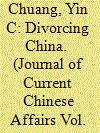

|
|
|
|
|
| Publication |
2011.
|
| Summary/Abstract |
This paper explores the popular concept of the relationship between Taiwan and China as a feminine/ masculine dichotomy which has been constructed within Taiwan's national imagination. First, I will focus on how this dichotomy has been created within the process of identity-shifting in Taiwan since the 1990s as manifested in Taiwanese pop songs. Second, I will demonstrate how it has been appropriated within the process of nation-building. Two primary questions will be addressed: How is the national imagination of Taiwan in Taiwanese pop songs constructed through maternal and feminine images? How is the matrilineal genealogy in Taiwanese pop songs appropriated by the opposition camp, namely the Democratic Progressive Party (DPP), to mobilize voters? I will investigate, from a cultural studies perspective, how cultural imagination has come to serve as the vehicle to formulate resistance, mobilize voters, gain power and, most importantly, reconstruct Taiwanese nationalism within Taiwan's political limbo for decades. Furthermore, Margaret Somers' discussion (1993, 1994, 1995a, 1995b, 1995c; Somers and Gibson 1994) of narrative identity is adopted as the framework for this paper in order to look at how identities are constructed within and across multiple realms. My research methods consist of conducting in-depth interviews and analysing texts.
|
|
|
|
|
|
|
|
|
|
|
|
|
|
|
|
| 14 |
ID:
162437
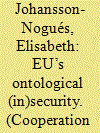

|
|
|
|
|
| Summary/Abstract |
The 2016 EU Global Strategy and the 2015 European Neighbourhood Policy (ENP) review have made stabilisation of the ENP area one of their main priorities. Our argument here, however, is that the Global Strategy and the ENP review not only seek to mitigate the numerous crises currently affecting the neighbourhood; they also aim to address a set of intra-EU vulnerabilities linked to events in the ENP area that are threatening the EU’s own ontological security. We employ narrative analysis to explore how insecurity in the EU and in the ENP area is affecting the EU’s relation to the neighbourhood-other and its understanding of the EU-self. Our main findings point to the Global Strategy and the ENP review providing ample measures to stabilise the neighbourhood. However, whether they have provided a sufficiently compelling narrative to enable the emergence of new emotional structures for the EU and its member states to make sense of themselves and their relation to the neighbourhood-other remains an open question.
|
|
|
|
|
|
|
|
|
|
|
|
|
|
|
|
| 15 |
ID:
111488


|
|
|
|
|
| Publication |
2012.
|
| Summary/Abstract |
This article examines the ways in which young Canadians represent the 'the War on Terror' in their narratives. I explore how a hegemonic nationalist narrative enters into this representation in different ways and positions itself in a dynamic tension with the USA, at times eliding the difference and at times affirming it. I illustrate that these students do not simply tell the narrative of the war, but use the deixis of 'we/us/our' or 'them/they/their' in a way that constructs multiple imagined communities. I argue that these presumably benign representations of Canadian involvement in the war produce banal nationalism that excludes 'others', and binds human imagination into a framework that works against critical thinking.
|
|
|
|
|
|
|
|
|
|
|
|
|
|
|
|
| 16 |
ID:
188085
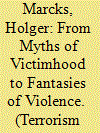

|
|
|
|
|
| Summary/Abstract |
Why is far-right rhetoric so dangerous? In recent years, scholars and policy makers alike have striven to unpack the black box of extremists’ online communication and the rise of far-right violence. Particularly the role of social media in spreading hate speech and fostering radicalization has caught a lot of attention; however, there has been little success in pinning down the drivers of violence. Drawing on the concept of dangerous speech, we take a step back from the violent effects of far-right online communication. Instead, we examine its logical functioning to illuminate the upstream processes that constitute hate and legitimize violence. More concretely, we study how far-right narratives employed on social media mobilize emotions that prepare for the acceptance or even use of violence. Analyzing the argumentative structures of two anti-immigration campaigns in Germany, we find a network of narratives where narratives of imperilment— supported by narratives of conspiracy and inequality—converge into a greater story of national threat and awakening. By constructing a situation of collective self-defense, violence becomes a logical option, even if violent action is not explicitly proposed. Counter-narrative efforts should thus not only focus on hate speech but also address the myths of victimhood, which are constitutive of (violent) palingenetic fantasies.
|
|
|
|
|
|
|
|
|
|
|
|
|
|
|
|
| 17 |
ID:
157796
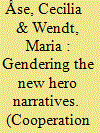

|
|
|
|
|
| Summary/Abstract |
During the 20th century, wars were fought primarily in the name of protecting the homeland. Making the ‘ultimate sacrifice’ was a national masculine duty and a key feature of military heroism. Today, human rights and international values justify war-making and legitimise military action. In one of these post-national wars, the International Security Assistance Force operation in Afghanistan, more than 700 European soldiers have lost their lives. How have these deaths been legitimised, and how has the new security discourse affected notions of masculinised heroism and sacrifice? This article investigates how the dimensions of national/international and masculinity/femininity are negotiated in media narratives of heroism and sacrifice in Denmark and Sweden. Regarding scholarly discussions on the professionalisation, individualisation and domestication of military heroism, the empirical analysis demonstrates that the Danish/Swedish nation remains posited as the core context for military heroism and sacrifice. In the media narratives, professionalism is represented as an expression of specific national qualities. The media narratives conflate nation and family and represent military heroes as distinctively masculine and national figures. It is argued that a family trope has become vital in present-day hero narratives. This trope is disposed towards collective emotions, national loyalty and conservative gender ideals.
|
|
|
|
|
|
|
|
|
|
|
|
|
|
|
|
| 18 |
ID:
190749


|
|
|
|
|
| Summary/Abstract |
Central to India–ASEAN relations have been a consistent equivalence between their similar core principles and outlooks, which have served as a shared value-based footing upon which the two entities have built and enhanced their relations. These underlying sets of norms inform their diplomatic dealings with each other, and stem from principles and practices critical to their foundational identities and experiences. This article investigates and evaluates the historical roots of these norms and then utilizes them as an analytical vehicle with which to trace the growing strategic convergence typifying present-day India–ASEAN relations. Drawing upon constructivist accounts that emphasize the role played by history, culture, identity and learning, the article considers the key areas of agreement in relations, and how a value-based form of analysis provides an essential lens through which to better understand material factors structuring their relations. It also underlines the analytical value and empirical richness that a norm-based approach provides for analyzing specific sets of norms in a specific state-to-multilateral interaction.
|
|
|
|
|
|
|
|
|
|
|
|
|
|
|
|
| 19 |
ID:
185332
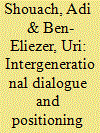

|
|
|
|
|
| Summary/Abstract |
How do immigrant’s children cope with racist hegemonic discourse? To what extent, is their response effective? The article addresses this issue through an exploration of the identity and positioning strategies of children of 100,000 ‘Black Jews’ who immigrated to Israel from Ethiopia at the end of the last century. Drawing on the sociology of generations, we show that members of the second generation of Ethiopian immigrants developed a different identity and a contradictory positioning strategy to that of the 1.5 generation, while both failed to reduce racism in Israel. Contrary to Karl Mannheim’s linear theory, we argue that intergenerational encounters produce a new identity and a new positioning strategy that may be effective in creating social change. It was only through massive demonstrations in the year 2015 that intergenerational dialogue was created, leading to a new positioning strategy that proved to be effective in undermining racist hegemonic discourse.
|
|
|
|
|
|
|
|
|
|
|
|
|
|
|
|
| 20 |
ID:
190176
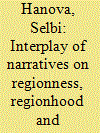

|
|
|
|
|
| Summary/Abstract |
This paper identifies the interplay between narratives on Central Asia as a region. It compares European Union (EU) narratives with those of the five post-Soviet states of Kazakhstan, Kyrgyzstan, Tajikistan, Turkmenistan and Uzbekistan. By doing so, it investigates the manifestations of narratives, stories and narrators who continue to construct and convey certain discourses about the region, comparing EU discourse and that of the local political elites in Central Asia, respectively. By looking at official discourse conveyed by the presidents of the countries and in key foreign policy documents, the interplay of narratives as dialogues between narrators is analysed, thus expanding into ideational analysis, an emerging trend in the literature on post-Soviet Central Asia.
|
|
|
|
|
|
|
|
|
|
|
|
|
|
|
|
|
|
|
|
|